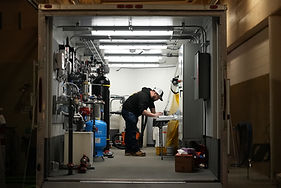Average Salary Ranges for Water Operators in Canadian Municipalities
Discover salary ranges for certified water operators by province and certification level below.
.png)
Alberta Operator-in-Training: $45,000–$52,000 Class I: $55,000–$65,000 Class II: $65,000–$75,000 Class III: $75,000–$85,000 Class IV: $90,000–$110,000
British Columbia Operator-in-Training: $42,000–$50,000 Class I: $52,000–$60,000 Class II: $62,000–$72,000 Class III: $72,000–$82,000 Class IV: $85,000–$100,000
Saskatchewan Operator-in-Training: $41,000–$44,000 Class I: $46,000–$53,000 Class II: $53,000–$62,000 Class III: $62,000–$70,000 Class IV: $75,000–$85,000
Manitoba Operator-in-Training: $43,500–$47,000 Class I: $50,000–$58,000 Class II: $60,000–$68,000 Class III: $70,000–$78,000 Class IV: $87,000–$95,000
Ontario Operator-in-Training: $46,500–$50,000 Class I: $53,000–$63,000 Class II: $63,000–$73,000 Class III: $73,000–$83,000 Class IV: $99,000–$105,000
Quebec Operator-in-Training: $40,500–$45,000 Class I: $47,000–$54,000 Class II: $54,000–$63,000 Class III: $63,000–$72,000 Class IV: $80,000–$90,000
Newfoundland & Labrador Operator-in-Training: $44,500–$48,000 Class I: $50,000–$58,000 Class II: $61,000–$68,000 Class III: $72,000–$78,000 Class IV: $88,000–$95,000
New Brunswick Operator-in-Training: $43,000–$46,000 Class I: $48,000–$56,000 Class II: $59,000–$66,000 Class III: $69,000–$75,000 Class IV: $86,000–$92,000
Nova Scotia Operator-in-Training: $43,000–$46,000 Class I: $48,000–$56,000 Class II: $59,000–$66,000 Class III: $69,000–$76,000 Class IV: $85,000–$92,000
Prince Edward Island Operator-in-Training: $42,000–$45,000 Class I: $48,000–$55,000 Class II: $55,000–$65,000 Class III: $65,000–$75,000 Class IV: $84,000–$90,000
Yukon Operator-in-Training: $55,000–$60,000 Class I: $60,000–$70,000 Class II: $70,000–$80,000 Class III: $80,000–$90,000 Class IV: $95,000–$115,000
Northwest Territories Operator-in-Training: $57,000–$62,000 Class I: $62,000–$72,000 Class II: $72,000–$82,000 Class III: $82,000–$92,000 Class IV: $97,000–$117,000
Nunavut Operator-in-Training: $60,000–$65,000 Class I: $65,000–$75,000 Class II: $75,000–$85,000 Class III: $85,000–$95,000 Class IV: $100,000–$120,000
Key Regional Trends
Alberta typically offers higher salaries across all certification levels due to its strong industry presence and demand for skilled operators. British Columbia and Ontario rank high in operator compensation due to large urban centers and water infrastructure needs. Quebec and Saskatchewan tend to offer lower salaries compared to other provinces, especially at lower certification levels. Smaller provinces like Prince Edward Island and Newfoundland and Labrador have moderate salaries, reflecting regional cost-of-living adjustments.
Notes on
Salary Data
These figures represent median wages and can vary based on experience, certification levels, and specific job responsibilities. Actual salaries can vary widely depending on factors such as geographic location, employer size, years of experience, and additional skills or certifications. For the most accurate and up-to-date information, consulting regional job postings or industry reports is recommended.
Additional Resources
Government of Canada's Job Bank: For a more detailed breakdown, including wage ranges and additional provinces and territories, refer to the Job Bank. Payscale Data: The salary range for Class IV Operators is supported by data from PayScale, indicating an average salary of $105,000 for individuals holding a Level 4 Water Treatment Operator Certification. For other certification levels, specific salary data is limited; the provided ranges are approximations based on typical industry progression.
Data Source
and Updates
Data Source: Government of Canada's Job Bank, updated as of December 3, 2024. These figures are estimates based on general industry data and may not account for all specific job postings or employer adjustments.
Largest Operator-Led Survey in Canada
Water Movement, guided by the first-ever national operator committee, conducted the largest operator-led survey in Canada, gathering insights from over 200 water operators working in Indigenous communities. With the highest participation rate recorded, the survey ensures accurate and trusted results to guide industry decisions. Ethical guidelines, including OCAP Principles (Ownership, Control, Access, and Possession) and the Tri-Council Policy Statement: Ethical Conduct for Research Involving Humans (TCPS 2, 2018), made this a transparent and inclusive effort.
What the Survey Revealed
Workload Insights
Compensation and Workload
Operators in some Indigenous communities earn 40% less than municipal counterparts despite taking on additional roles, such as firefighting and plumbing. Median salaries for these operators are significantly below national averages.

Innovation
Overwork and Creativity
Operators often go beyond their job descriptions, working with limited resources and needing to resort to creative solutions to solve problems.

Operator Education
Training and Accessibility
Limited in-community training options hinder operator growth. Online-only programs don’t work well for hands-on learners.

System Challenges
Barriers to Clean Water
Over-engineered water systems in remote areas are costly and inefficient, creating unnecessary challenges.

Recommendations to Support Operators
Working in Indigenous Communities
Developed by operators and refined through nationwide insight sessions, these recommendations reflect the expertise of those managing water systems in Indigenous communities.

Fair Compensation and Job Recognition
Operators in Indigenous communities deserve pay that reflects their essential work and the additional responsibilities they take on, such as firefighting, plumbing, and snow removal. Addressing the 40% wage gap with municipal counterparts is critical to achieving equity. Ensuring long-term job security through competitive salaries and recognition of contributions will help retain skilled operators and attract new talent.

Accessible Training and Scalable Solutions
Accessible and hands-on training opportunities are vital to reducing barriers for operators in remote Indigenous communities. Offering in-community programs tailored to tactile learners ensures that all operators receive the support they need to succeed. In addition, designing practical, scalable water systems—rather than over-engineered ones—can address local realities and reduce maintenance challenges.

Holistic Support Systems
Supporting operators goes beyond training and compensation. Addressing mental and physical health through better access to resources can combat burnout and overwork, which are common challenges in remote communities. Ensuring the timely delivery of spare parts and funding keeps water systems operational. Building mentorship programs fosters knowledge sharing and helps new operators grow in their roles.
Honouring the Work of Operators in Indigenous Communities
The survey highlights the resilience, creativity, and challenges of operators working in Indigenous communities. Together, we can support them in ensuring safe and sustainable water systems for generations to come.
We are deeply grateful to the operators who shared their expertise, voices, and experiences to illuminate the realities of water operations in Indigenous communities. Their insights guide meaningful change and drive impactful solutions.
Want to help support operators in Indigenous communities?
Learn more about how you can get involved or explore additional initiatives that make a difference.


